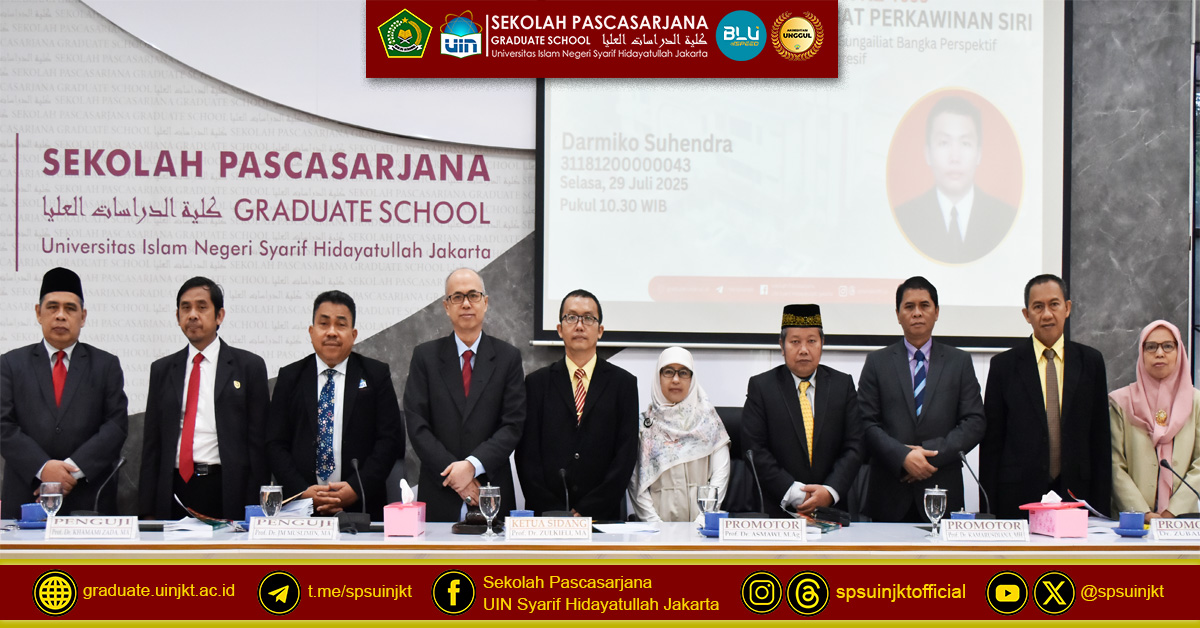Darmiko Suhendra Doctoral Promotion Exam, The Origin of Children Due to Series Marriage
Auditorium of Prof. Dr. Suwito, MA SPs UIN Jakarta, SPs NEWS: The Graduate School of Syarif Hidayatullah State Islamic University Jakarta held the 1633rd Doctoral Promotion Exam in the Auditorium Room of Prof. Dr. Suwito, MA SPs UIN Jakarta, on Tuesday, July 29, 2025 with promovendus Darmiko Suhendra.
Darmiko Suhendra is a student of the doctoral study program in Islamic Studies with a concentration in Sharia. Darmiko wrote a dissertation entitled "The Origin of Children Due to Serial Marriage in the Decision of the Sungailiat Bangka Religious Court: Maqāṣid al-Sharī'ah Perspective and Progressive Law"
The research aims to examine the review of Islamic law and positive law in Indonesia related to the status of children born from serial marriage. Furthermore, this dissertation analyzes the ijtihad of judges in determining the status of the origin of children from serial marriages at the Sungailiat Bangka Religious Court, especially from the perspective of Maqāṣid al-Sharī'ah and progressive law. Not only that, the impact of the judge's decision in the case of determining the origin of the child is also the focus of his analysis.
In his methodology, Darmiko Suhendra uses a qualitative approach in the form of a case study, presenting the data descriptively. This research is classified as a normative legal research that applies a statutory approach to examine various relevant regulations, as well as a case study approach to examine a number of cases of determining the origin of children in the Religious Court.
The results of his research concluded that in the perspective of Islamic law, the status of children is divided into two: children born out of a legal marriage, and children born outside of a legal marriage (including children of adultery and li'an). Meanwhile, Indonesia's positive law recognizes three categories of child status: children in marriage (legal), children out of wedlock, and children without marriage.
Interestingly, Darmiko found that the determination of the origin of children in the decision of the Sungailiat Religious Court, when analyzed with Maqāṣid al-Sharī'ah, falls under the category of hifz an-nasl (protection of nasab). These decisions effectively protect the status of children born from unregistered but religiously valid serial marriages, by naming the child to his biological father. This is important to prevent children from becoming "fatherless children" which can have social and legal impacts, as well as to guarantee children's rights such as identity, economy, life, and security.
From the review of progressive legal analysis, the determination of the origin of children in the Sungailiat Religious Court shows several perspectives. First, he breaks down the rigidity of the formality of marriage law, reflecting a non-positivistic approach that prioritizes social reality. Second, the main focus is justice for children, ensuring that children as legal subjects are protected from discrimination in the legal status of their parents. Third, this decision is in line with the decision of the Constitutional Court No. 46/PUU-VIII/2010, affirming the spirit of the constitution and children's rights. Fourth, it is a reflection of the ethics of substantive justice, in which judges do not simply see "unrecorded marriages as the same as children out of wedlock," but rather at the material truth and inner bond of the parents.
The implications of the judge's consideration and interpretation of this decision are very significant. A legitimate child formally gets the right to status, alimony, and inheritance. Meanwhile, biological children, even though they do not have an inheritance relationship, still get the right to alimony. Materially, legitimate children are entitled to nasab, rada'ah (breastfeeding), hadanah (nurturing), territory (guardianship), nafaqah (alimony), and mawarith (inheritance). Biological children, on the other hand, acquire the rights of rada'ah, hadanah, and nafaqah.
This research emphatically supports Gustav Radbruch's theory of justice which emphasizes that law must include justice, legal certainty, and utility. Darmiko Suhendra also explicitly expressed his disagreement with Mardani's view in the Islamic family law book that children born out of wedlock have no legal relationship with their father, asserting that substantive justice should always be a priority.
Darmiko Suhendra successfully defended his dissertation under the guidance of Prof. Dr. Asmawi, M.Ag, Prof. Dr. Kamarusdiana, MH and Dr. Zubair, M.Ag, and was tested in front of a board of examiners consisting of Prof. Dr. Zulkifli, MA, Prof. Dr. Asmawi, M.Ag, Prof. Dr. Kamarusdiana, MH, Dr. Zubair, M.Ag, Prof. Dr. JM Muslimin, MA, Prof. Dr. Abdul Halim, M.Ag and Prof. Dr. Khamami Zada, MA.
After paying attention to the dissertation writing, the comments of the examiner team and the answers of the promovendus, the examiner team determined that Darmiko Suhendra graduated with the title of Very Satisfactory. Darmiko Suhendra is the 1633rd Doctor in the field of Islamic Studies, in the doctoral program of the Graduate School of UIN Syarif Hidayatullah Jakarta. (JA)

